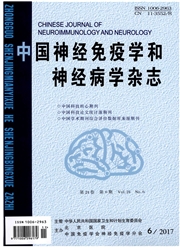

 中文摘要:
中文摘要:
目的探讨过氧化物酶体增殖物激活受体γ(peroxisome proliferator-activated receptor gamma,PPARγ)对人类免疫缺陷病毒-1型反式转录激活因子(HIV-1transactivator of transcription,HIV-1Tat)诱导的脑微血管内皮细胞中黏附分子反应的影响及其作用机制。方法将培养的人脑微血管内皮细胞(human cerebral microvascular endothelial cells,hCMEC/D3)给予HIV-1Tat、PPARγ激动剂罗格列酮、PPARγ拮抗剂GW9662、蛋白激酶B(Akt)抑制剂KP3721进行干预,并设立对照组。分别以蛋白免疫印迹法和实时反转录聚合酶链式反应检测hCMEC/D3中细胞间黏附分子-1(intercellular adhesion molecule-1,ICAM-1)、血管细胞黏附分子-1(vascular cell adhesion molecule-1,VCAM-1)蛋白和mRNA表达。结果 HIV-1Tat可诱导黏附分子ICAM-1和VCAM-1的蛋白(P〈0.05,P〈0.01)及其mRNA表达增加(均P〈0.01),PPARγ激动剂罗格列酮可抑制HIV-1Tat诱导的ICAM-1蛋白(P〈0.05)与mRNA以及VCAM-1的mRNA表达(均P〈0.01),而这种抑制作用可被PPARγ拮抗剂GW9662和Akt抑制剂KP3721逆转(均P〈0.01)。罗格列酮可抑制HIV-1Tat诱导的Akt磷酸化反应(P〈0.01)。结论 PPARγ可抑制HIV-1Tat诱导的脑微血管内皮细胞中黏附分子反应,Akt信号转导通路在PPARγ激动剂抑制血管内皮细胞炎性反应中起到重要的作用。
 英文摘要:
英文摘要:
Objective To evaluate the protection effect of peroxisome proliferator-activated receptor gamma (PPARy) against HIV-1 Tat-induced responses of adhesion molecules in brain microvascular endothelial cells and the possible signaling mechanism. Methods The protein expressions or mRNA levels of intercellular adhesion molecule-1 (ICAM-1) and vascular cell adhesion molecule-1 (VCAM-1) in human cerebral microvascular endothelial cells (hCMEC/D3) were assessed by Western blot or Real-time-PCR, with the exposure of HIV-1 Tat, rosiglitazone (PPARy agonist), GW9662 (PPARy antagonist) and/or KP3721 (Akt inhibitor). Results HIV 1 Tat induced upregulation of the protein expression of ICAM-1 (P〈0.05), VCAM-1 (P〈0.01) in hCMEC/D3 as well as mRNA levels (P〈0.01, respectively). Exposure to PPARy agonist rosiglitazone decreased Tat-induced protein expression of ICAM-1 (P〈0.05), ICAM-1 mRNA and VCAM-1 mRNA levels (P〈0.01, respectively). This inhibition was abolished by the addition of PPART antagonist GW9662 ( P〈0.01, respectively) and Akt inhibitor KP3721 ( P〈0.01, respectively). Treatment of hCMEC/D3 with rosiglitazone dramatically inhibited the HIV-1 Tat-induced inflammatory activation of Akt phosphorylation (P〈0. 01). Conclusions PPARγ may inhibit HIV-1 Tat-induced responses of adhesion molecules in brain microvascular endothelial cells. Akt signaling pathway plays a key role on the protection effect of PPARγ agonist on vascular inflammatory response that contributes to the destruction of blood brain barrier.
 同期刊论文项目
同期刊论文项目
 同项目期刊论文
同项目期刊论文
 Transplantation of differentiated bone marrow stromal cells promotes motor functional recovery in ra
Transplantation of differentiated bone marrow stromal cells promotes motor functional recovery in ra Hypoxia induces dysregulation of Connexin 43 by modulations of Matrix Metalloproteinase via MAPK sig
Hypoxia induces dysregulation of Connexin 43 by modulations of Matrix Metalloproteinase via MAPK sig 期刊信息
期刊信息
